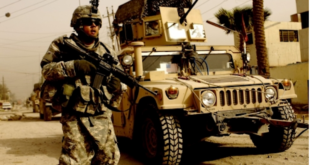SRIFA — They use three-digit numbers as code names, live off canned tuna, and tape over their jewelry so an accidental twinkle doesn’t give away their position to Israeli war planes.
Among the Hizbollah fighters prowling what remains of the heavily bombed south Lebanese village of Srifa are a pair of middle school history teachers who have given up their grade books for two-way radios and Kalashnikovs.
Over cups of coffee and the din of Hizbollah’s FM radio station narrating developments on the frontlines, they opened up to visitors recently and offered a glimpse into the fighters’ secretive world.
“This is the battle we have long expected and long prepared for,” says Hajj Rabia Abu Hussein — known to his soldiers simply as “103.” “I know my mission. I must make my rockets hit Israel,” he says matter of factly.
The 40-year-old field commander, who oversees military activities in one sector — generally comprising three villages — of the Hizbollah-dominated south, says he has fired many such rockets since the conflict began 20 days ago. As Hussein talks, he fingers his Motorola radio, his means of communication with his soldiers farther afield. He wears trainers, a blue denim buttondown shirt and a baseball cap that he slings backwards when the conversation turns intimate.
Hussein sits beside Abu Mohammad, 44, a longtime friend in Reeboks, a loose fitting T-shirt and cargo pants.
In their fashion choices, mild manners, and neatly trimmed beards, Abu Mohammad – code name “121” — and Hajj Hussein very much fit the Hizbollah mold.
They shift seamlessly from civilian garb to soldiers’ wear, they say.
“Our people are outfitted as soldiers, but when we are among civilians then we dress normally. When we are in the field, we dress as soldiers,” says Hussein.
“It’s not reasonable to walk around in military uniforms and carry rifles when, for example, the Red Cross comes into town.” The bucolic farming village they grew up in is one of dozens of similar hamlets scattered across these hills, where Hizbollah grew into a potent fighting force and popular political party. Today these villages are absorbing the brunt of the Israeli onslaught. The Shiite fighters are outgunned, outmanned, and confronting one of the most technologically savvy armies in the world. Still the Hizbollah rockets continue to fall on northern Israel. Hussein and his comrade-in-arms Abu Mohammad explain how the Shiite fighters continue to dodge Israel’s wrath and live to fight another day. “We use local knowledge,” says Hussein. “On the radio, we talk about a certain tree or a certain cliff. How will the Israelis understand that?” Hussein and Mohammad, not their real names, have grown up together in these villages, and frolicked in the surrounding hills as young boys.
In their current struggle, this shared history of fellow soldiers is a powerful weapon that helps them evade Israeli intelligence, they say.
“For example Hajj used to love someone about 20 years ago,” says Abu Mohammad. “So I’ll tell him, ‘Hajj, go and meet me at the house of the girl you used to love, who melted your heart.” Hussein pulls a laminated card from his pocket. On it are the names of his fighters and their positions, along with corresponding code numbers and code names.
“Don’t think that we use only primitive means of communication,” he cautions.
They speak to the more routine aspects of their struggle as well: Their daily diet, what they refer to as “the mujahedeen’s lunch.” “We eat mostly canned food, mortadella, tuna, and some chocolate,” says Hussein. “But yesterday we had fried potatoes and sometimes we make eggs.” Hussein joined the group that would soon evolve into Hizbollah in 1982. Then they were battling an Israeli occupation that stretched to the suburbs of Beirut. It took 18 years of sporadic attacks to convince the Israelis to finally withdraw from all of Lebanon. Hussein has covered a large ring on his right index finger with tape. The ring glistens in the sun and might be picked up by a trolling Israeli drone, he fears.
“Muslims have the battle between the Prophet Mohammad and the Koraysh,” says Abu Mohammad, referring to the prophet’s early struggle against Mecca’s merchant class. “There was a big difference in the numbers between the two parties, but the Prophet Mohammed fought and won. God said don’t worry I will assist you with angels you can’t see.” Hizbollah fighters, now scattered throughout the south, says Mohammed, “are as numerous as those angels.” On Friday night, Israel withdrew its soldiers from two Lebanese villagers. “Israelis said their priority is to destroy Hizbollah and then they changed and said it is to destroy Hizbollah’s weapons,” says Hussein. “Then they said the would occupy Lebanon up to the Littani River. Then they said just six kilometres, and now they’re saying two kilometres.” “Israel has admitted that they have failed and can’t achieve their objectives.” “It’s like we have a holy guarantee of victory,” says Mohammad.
“If I am martyred, I am victorious and if we are victorious then we are victorious.” These fighters don’t speak like the rabid fanatics who behead foreigners in the name of Al Qaeda and other such Jihadist groups.
“We don’t love killing,” says Hussein. “We look at all people as brothers. We deal with people as people, regardless of religion, but we will defend our land, our honour and our dignity.” “Just as we love martyrdom we also have love for life, we don’t want to die just to die.”
 Eurasia Press & News
Eurasia Press & News



